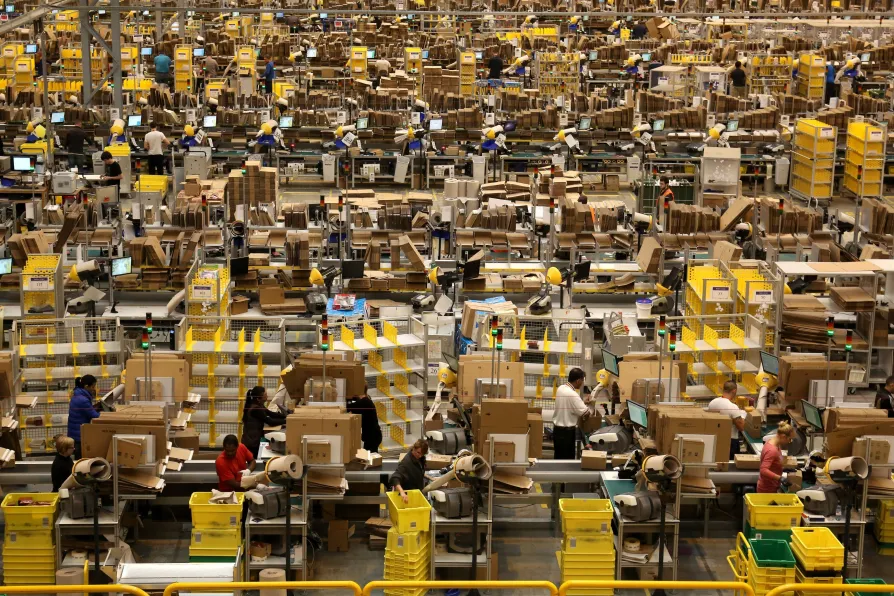Labour prospects in May elections may be irrevocably damaged by Birmingham Council’s costly refusal to settle the year-long dispute, warns STEVE WRIGHT
From Amazon’s monitored warehouse hell to delivery workers being paid per package, exploitative work destroys collaborative relationships young people need — more screen time and 12 new AI ‘friends’ will only make things worse, writes ALAN SIMPSON

 Workers pack orders on the warehouse floor at the Amazon UK Fulfilment Centre in Peterborough, Cambridgeshire
Workers pack orders on the warehouse floor at the Amazon UK Fulfilment Centre in Peterborough, Cambridgeshire
OH NO! Just when Keir Starmer should be rebuilding parliamentary friendships, he goes and picks a fight with them. And the crime of these Labour rebels? Defending disabled people from ill-thought-out benefit cuts.
It’s hard to know whether to count this as dictatorship or dementia.
Starmer’s real problem is that politics, as we know it, is falling apart. The model is broken, but abandoning it is what Treasury orthodoxy most resists.
What Starmer needs to do is to step back from “loyalty” obsessions and take a fresh look at the importance of “friendship” in our Age of Exploitation.
You’ve got a friend
I would begin by inviting him (and you) to make a choice. It isn’t complicated. There are two offers of friendship on the table, but you can only accept one. One of the contenders is Mark Zuckerberg, the other is Carole King.
King’s offer is by far the simplest. All she says is:
“Winter, spring, summer or fall
All you have to do is call
And I’ll be there (… yeah, yeah, yeah)
You’ve got a friend.”
Zuckerberg’s pitch is more elaborate and ambitious. Under him, Meta conducted detailed research among young Americans and discovered that, on average, young people felt they only had three close friends to call on. Most wished they had more. Their ideal number seemed to be 15.
This is a difficult gap to fill, especially when the scope for direct social interaction keeps getting squeezed. More and more encounters are becoming on-screen rather than in-person. Zuckerberg’s pledge is to fill this gap.
Under him, Meta will create 12 new “personalised” AI friends for each of us. That is the offer.
Zuckerberg would make loneliness and social isolation a thing of the past. No-one need grow up “friendless.” You won’t even need to leave your screens. How much easier could life get?
Despite this, my choice is simple; Carole King every time. But then, I am the wrong generation. And the tide is flowing Zuckerberg’s way.
Apparently, British teenagers already have seven hours 22 minutes of screen time every day. Many are halfway towards accepting Zuckerberg’s offer. But is this what we need?
A Feast of Fools
If the kids seem lost, don’t look to the grown-ups for answers, for we are at the root of the problem.
Parliament is in the grip of a broken economics and in the throes of making a complete ass of itself. Chasing disability benefit cuts creates more divisions than it heals. Then, taxing the direct employment that brings people into contact with each other just accelerates the race towards dystopia.
The government must grasp that a different economics is needed. Our thinking has to be turned upside down. Social cohesion (rather than conventional “growth”) must become the central plank of tomorrow’s economics. And with AI threatening to replace most programming jobs within the next five years, we are going to need to create this cohesion more than ever.
If Britain faces a “1945 moment” of policy-making, we are ill-served by a Parliament stuck in the trenches of 1918 thinking.
Our European partners used to laugh at us because Britain always seemed to begin by asking the wrong question. We obsess about the first line of “how much does it cost” rather than asking “where does the money go”? Disability benefits highlight this more than anything.
Few (if any) recipients of disability benefits have offshore bank accounts. The benefits go into local bank accounts, get spent in local shops and on access to local services. All of these “cash destinations” employ local people who, in turn, pay taxes that make their way back to the Treasury. It’s how the money-go-round works.
This is a model of circularity whose virtues have yet to reach Amazon. None of Britain’s disability-benefit recipients made it onto the Bezos guest list for his wedding in Venice. He could afford this because Amazon makes zero tax payments into Britain’s Exchequer. How else do you afford to hire Venice?
Mindless mediocrity
This is the political shift in the nature of capitalism that politicians have been reluctant to address.
When wealth was about the ownership of land, the government/monarch taxed the land. In the agricultural revolution, the state (and local barons) taxed the produce of the land. When the industrial revolution kicked in, taxation shifted to production and employment. But when Thatcher and Reagan rigged the shift into financial capitalism, Treasury thinking simply froze in time.
Perhaps this was because money was easier to move around surreptitiously than goods. Perhaps it was because money became more skilled at buying its way into Treasury mindsets. Perhaps it was because money has found it simpler just to buy politicians. Whatever. The reality is that a vast array of concessions and inducements now reward the accumulation of wealth rather than its taxation.
In 1972, the economist James Tobin proposed a fractional tax on short-term financial transactions. This Tobin Tax would have constrained the casino tendencies of financial markets. It would have had no effect on long-term investments, but would have slowed down the roller-coaster disruption of speculators. No one took any notice. So, finance progressively took ownership of politics.
This is how we ended up with a Labour government tearing its credibility apart by chasing benefit cuts and harassing the unemployed rather than tackling tax evasion.
But what does this have to do with friendship?
The Life of Brian
There is a lot of sloppy political talk about young people being reluctant to work. What gets omitted is any real conversation about the nature of work itself.
So we need to talk about Brian: Brian the factory worker, Brian the delivery driver, Brian the door-to-door salesperson. The experience is just the same if Brian is Beth. All genders are being increasingly marginalised in today’s marketplace.
Political obsessions with “productivity” and “growth” accelerated the replacement of people with machines. Factory-based industrial production once carried with it a layer of apprenticeships that were also pathways for young people into the adult world.
These were the settings in which people learned to relate to each other and to those alongside, whatever their race, gender and generation. Automation shreds such pathways and relationships. Not only have machines been replacing people, they undermine the human interactions that go with collaborative work.
Workers in Bezos’s Amazon factories are monitored by devices that measure the number of individual tasks to be performed per hour. Amazon delivery drivers have delivery schedules programmed by computer, with their routes specified too. If you fall behind schedule, the computer asks you to explain yourself. Traffic jams and congestion are no excuse. And tough luck if the delivery address is on the 14th floor of a flats block.
Delivery workers are increasingly paid by the item rather than by the hour. And daily item numbers have begun rising into the hundreds. Long working days have become the norm. Lunch breaks with colleagues belong to a different era or a different planet. Drivers take their (working) lunch with them, along with some means of taking a discreet pee when they need to. No wonder turnover rates are high.
A dumped generation
It’s not just Amazon. One of my daughter’s first post-college jobs was with a company “helping people reduce their energy bills.” Nice thought. In effect, though, it was door-to-door selling of a switch of energy suppliers. But understand the context. Her regular 10-hour day began with a motivational talk from the boss about how much workers could earn if they applied themselves properly.
Then the team were whisked off to a distant estate and given “patches” to work. You couldn’t take a bag with your lunch in it, or a drink; too unprofessional. In any case, “lunch” could not be taken till 2.30pm, when parents head off to collect their children from school. Then you worked on until after 7pm before making your own way home.
Rescuing her from a remote estate, on a cold, wet, November evening, brought home how exploitative this work was. Worse still was that they were paid per customer sign-up, not per hour. The final insult, though, was that she wasn’t an employee at all. All the staff contracts said they were freelancers. Each was left to sort out their own insurance and tax returns as best they could. This is usury, not employment. And it is seeping into everywhere.
Even “respectable” centres of employment are starting to recruit peripheral staff on a self-employed/independent contractor basis. The hike in employers’ NI only makes this worse. Before whinging about “work-shy youth,” politicians need to fundamentally rethink the tax treatment of work.
Productivity obsessions and hikes in employers’ NI undermine permanent job security. So why not replace employer NI with a turnover tax on sales and close the tax exemption loopholes on big companies?
Amazon (and Bezos) only get away with paying zero taxes because of the loopholes and allowances they can claim. Flip the dial and make the tax system favour those providing secure, long-term employment (and training). Britain has a lot of ground to make up here, not least in the arena of skill training.
Tunnel vision
Much enthusiasm has just been expressed about the prospect of linking the Shetland Islands with a series of five undersea tunnels. Brilliant. But could we do it? Well, the more remote Faroe Islands are already connected by 23 tunnels, four of which are beneath the sea.
Britain’s problem is that we haven’t trained the engineers needed to do the work. Zuckerberg isn’t offering to do so either. But the Danes and the Dutch would. They have already trained generations of engineers to do just that.
It’s the same with Britain’s rail infrastructure. To do something that radically cuts air pollution and road congestion, we need a national rail revival. Forget HS2 or more roads, this is more about freight lines and local rail/tram networks. But again, Britain long ago abandoned the skills programmes that trained the workers who could deliver this renewal.
No less important is renewal of the care sector. I’m old enough to remember when this was delivered by local authorities, on a not-for-profit basis. An abundance of care homes offered secure local employment and strong community (and inter-generational) ties that put caring before profiteering. Once again, the money-go-round put everything back into the local economy rather than heading offshore.
And we haven’t even begun to talk of the human benefits of an economy that invested in the repair of nature and care of the planet. That’s where befriending ourselves and each other becomes the start of a different journey.
We are currently stuck in what ecological economist Tim Jackson calls “the careless economy.” In his latest book, Jackson calls for a revolution in thinking, to rescue us from “our conflict-ridden, profit-driven, power-crazed and desperately insecure world.”
This is where Starmer seems to be stuck. Worse still, it is what we risk dumping on the generations of young people who follow on.
So, before he goes looking for colleagues to pick fights with, maybe Starmer should just take a walk around the park and talk it through with a friend.
I doubt that Zuckerberg would be inclined to join him … but I bet King would.











